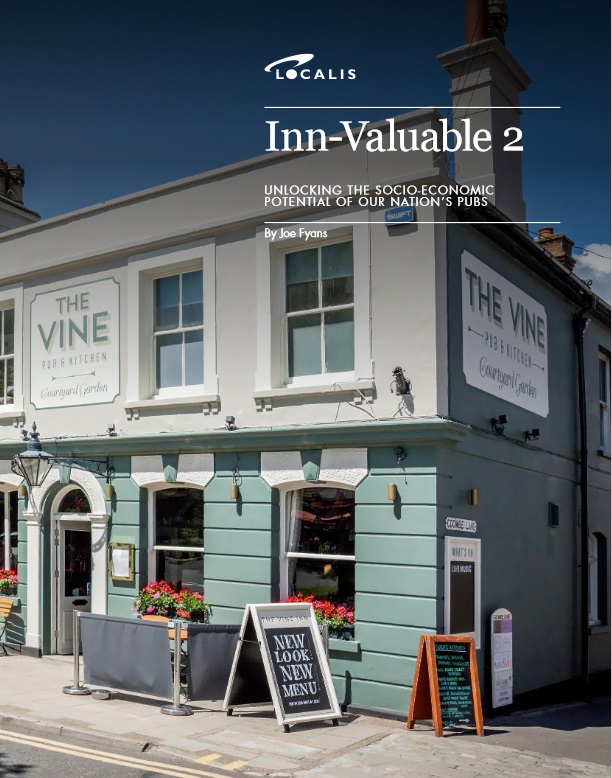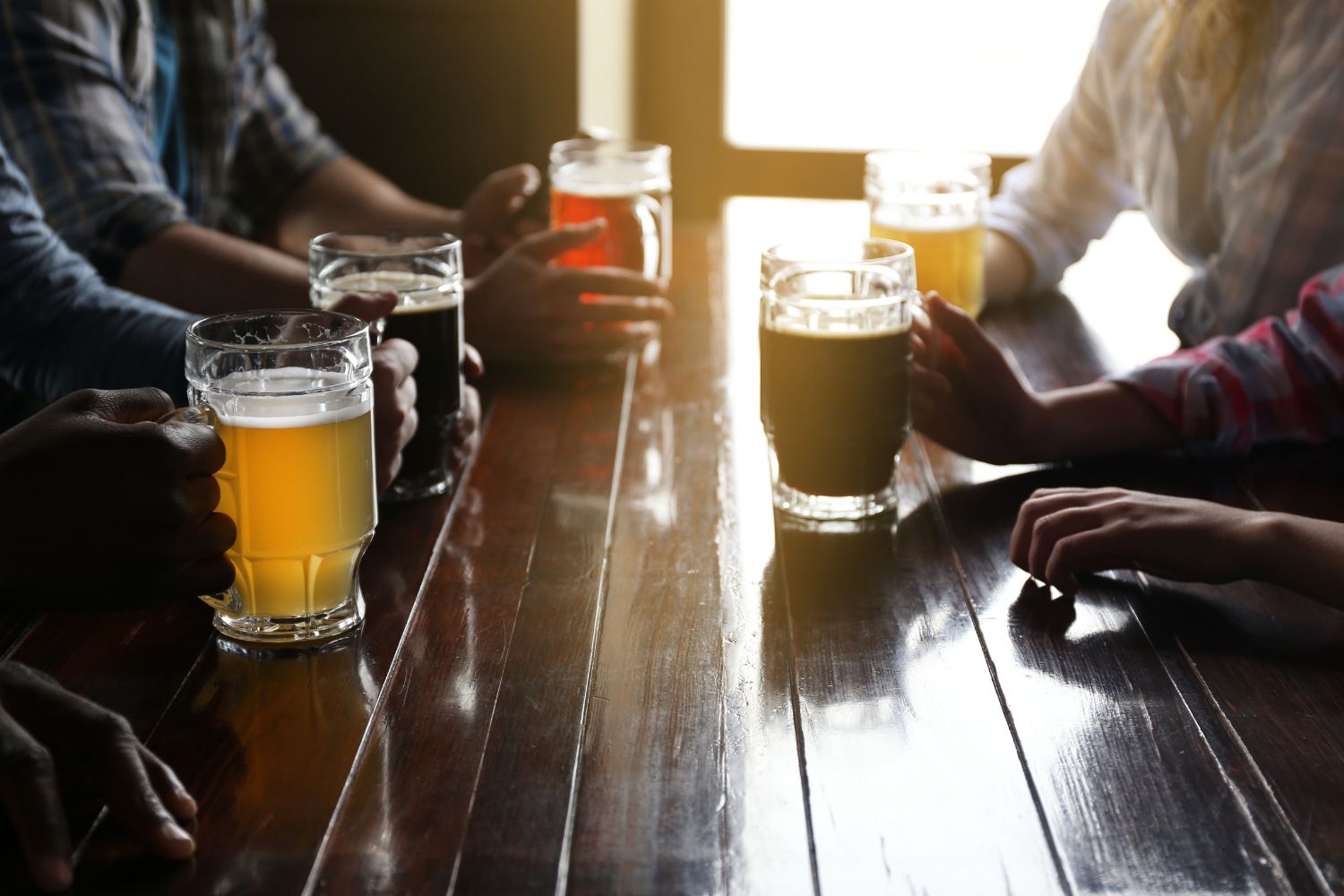The Labour party conference is in full swing, and doubtless there have been many fringe meetings and get-togethers, some in pubs and bars. But, comrades, pubs are for life and not just for conference, and there are steps you can take to help ensure that they not only survive but thrive.

Today is the day that independent cross-party think tank Localis has chosen to launch its new report: Inn-Valuable 2: unlocking the socio-economic potential of our nation’s pubs.
Government must overhaul a counterproductive regulatory and tax landscape that threatens the future of the ever-popular British local pub as a vital social and economic anchor for communities across the country, says the group.
Localis is urging the government to launch a taskforce to clear obstacles that endanger the beer and pub sector. It’s a sector which cumulatively supports more than one million jobs, generates £34.3bn in gross value added (GVA) to the economy, and delivers £11.4bn in tax revenues to the Exchequer annually.
According to polling undertaken by YouGov for the report, 72% of people felt the impact of pubs to community life to be positive. When asked if pubs are important in bringing people together, more than four-in-five (81%) of British adults agreed they are, with just 14% feeling that they are not.
Polling carried out for the report showed nearly three-quarters (73%) of British adults felt that pubs help combat loneliness in their local area. Among pro-community activities supported by local pubs, nearly half (42%) of people were aware of pub events that bring the community together, more than a quarter (27%) knew of local pubs that supported charitable causes, and close to one in five, 19%, knew of local pubs that supported vulnerable people in their area.
The research identified, from case studies taken in pubs across the country, some dominant themes on how the sector supports local people and communities, namely by:
- combating isolation;
- supporting local causes;
- bringing local business together;
- keeping prices down so pubs remain accessible social spaces for communities.
Pollsters also found that among those who’ve ever visited a pub, more than half (53%) had met a friend in one, while nearly two-in-five (38%) of people had visited the pub to meet up with family, a quarter (26%) had enjoyed Sunday lunch in one, and 11% of the public had attended a pub-held birthday party in that timespan. In addition, 7% of the public had used pubs for dating purposes and 20% watched a sporting event.
A key recommendation of the report is a call for short-term support by extending business rates relief for hospitality and increasing the window for this to three years in line with the spending review period to give long-term certainty to pub landlords.
The report authors also call for a government taskforce to arrest the decline of the Great British pub which would identify policies to ensure long-term sustainability for the sector, including:
- reviewing business rates and excise duty;
- providing employment incentives so pubs keep employing younger members of staff;
- examining planning policies to support the night-time economy and preserving the role of local pubs as social, cultural, and economic anchors in towns and villages.
“Pubs are more than just businesses, they are the heart and soul of our communities,” said report author Joe Fyans.
“To ensure their long-term survival, we need a policy framework that recognises their value and supports their continued success.”
Emma McClarkin, chief executive of the British Beer and Pub Association, feels that the research cements what people up and down the country know and believe. That the pub is a home from home, the beating heart of our towns and villages, and offers a warm welcome to people from all walks of life.
“As this research proves, pubs aren’t just about a pint — people know that pubs stave off loneliness, support the vulnerable in their communities, and raise millions for charity.
“While we know that brewers and pubs invest billions into the economy, their huge contribution to our communities and society is priceless and they must be supported.
“Government must use this Budget to cut beer duty, reform business rates, and maintain 75% business rates relief so that pubs and brewers can remain a cherished part of society.”
The Budget will be delivered on 30th October by chancellor Rachel Reeves. Should we expect an alcohol duty rise? It would be consistent with a lot of government ideas which aim to improve the health of the nation and reduce the burden on the NHS. But that would be yet another reason for people to cut down on visits to the pub, or curtail the time they spend there.
The Telegraph is reporting that Reeves has not ruled out a duty rise to help with the reported £22bn black hole of funding. Despite having some of the most highly-taxed beer drinkers in Europe, it seems the best we can hope for is a freeze, which would feel like a win.

Hopefully the idea of banning smoking in gardens will stay in the suggestion box. Smoking has already drastically reduced in pubs since the interior ban came in in 2008, and the rising age at which one can legally smoke, which will presumably become law in the Parliament, will mean the tobacco buying demographic reduces.
The Campaign for Real Ale (CAMRA) is backing the call for business rates reform, and it has also joined forces with the Society of Independent Brewers and Associates (SIBA) in calling for a 20% tax reduction on beer served in pubs, as against retail rates in supermarkets and off-licences. The organisation calculate that this move would create thousands of new jobs and contribute £70 million to the economy.
CAMRA vice-chair, Ash Corbett-Collins, said: “Pubs are the beating heart of communities, but they’re being crushed by an unfair system that favours online giants and multinational brewing conglomerates.
“We want the chancellor to understand that the range of measures we’re calling for aren’t just about supporting the long-term future of the industry. This is also about local jobs, encouraging investment, and ensuring that communities have a space to come together.
“Cutting the rate of tax on pints across the UK, and meaningful reform of the business rates system in England will make all the difference to both consumers and the trade.”
CAMRA is urging its members to contact their MPs, asking them to lobby the chancellor ahead of the Budget.


